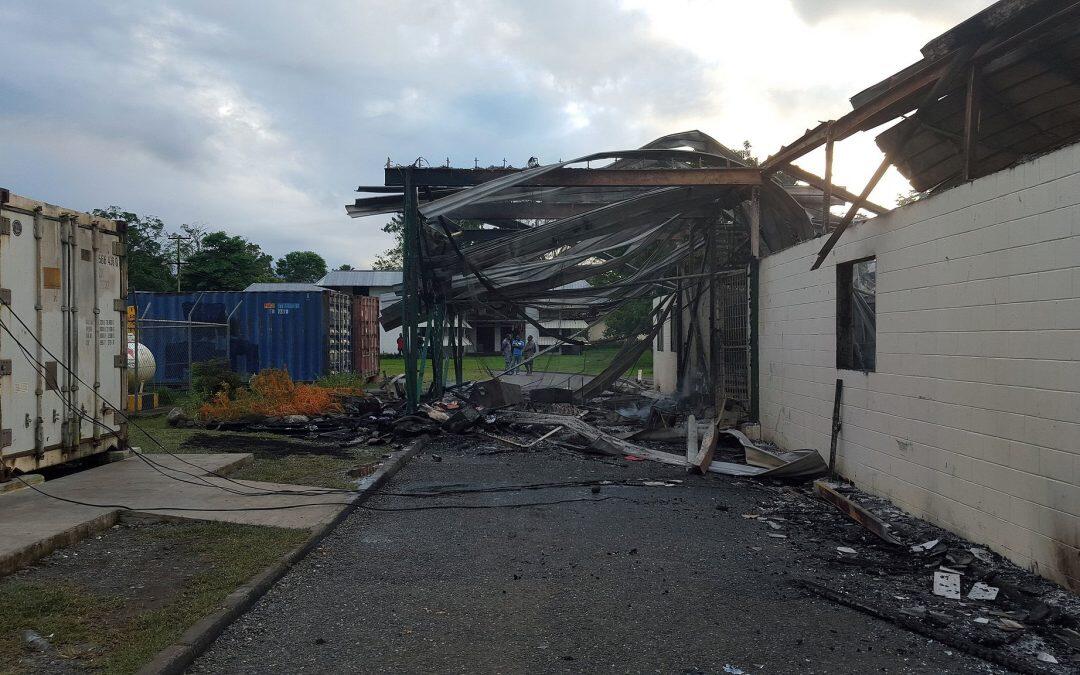The University of Papua New Guinea has cancelled the academic year after student boycotts and protests saw the murder of one man and the shooting of eight students by police officers.
Weeks of protests, centred around the prime minister’s avoidance of a police inquiry into corruption allegations, escalated when police fired into a Port Moresby protest march at the University of Papua New Guinea (UPNG) last month.
In response the government announced curfews on university campuses and called a commission of inquiry into the shooting, which saw eight seriously injured but no fatalities.
A boycott of classes, as well as violent and destructive protests continued around the country in response to the shooting, and this week the chancellor of the UPNG announced the suspension of the academic school year. Chancellor Nicholas Mann also suspended the student representative council (SRC), which had organised the original boycott and which the chancellor blamed for the violence.
“The illegal activities led by the SRC since the second of May 2016 has created a threatening environment leading to a traumatisation of students and staff,” said Mann.
Mann said the rule of law had been replaced by mob rule and violence, and that “the learning environment has been turned into a tribal war zone with painted faces, war cries and knife-wielding persons.”
Protests began among the student body earlier this year, over prime minister Peter O’Neill’s refusal to face police for questioning over a long-running corruption investigation.
Demonstrations had escalated to demands he step down, and the shooting – which was planned as a peaceful march on parliament in support of a proposed no confidence motion – sparked outrage across the country.
“Since then things have really devolved, and it’s become a bit more violent,” said Jonathan Pryke, research fellow at the Lowy Institute’s Myer Foundation Melanesia program.
“UPNG campus has had some damage to it. The students are quite scared because of the shooting – rightly so – and in the highlands region it’s gotten even worse.”
Protests spread to universities in Lae and Goroka. Buildings and cars were set alight and destroyed, and a student from the Southern Highlands was killed by a group of men with machetes at Lae’s University of Technology.
Government MPs and religious leaders called for calm from the students.
Pryke told Guardian Australia from Port Moresby the student demands remained the same, but were now heightened, after O’Neill criticised media reporting of the shooting and questioned outside influence of the student demonstrators.
“What he should have been doing was addressing the fact that he put police into a situation with heavy munitions and they eventually shot students,” said Pryke. “Eight students were wounded, it’s a miracle no one was killed.”
It’s unclear if other universities will take the same action as UPNG, but the first semester at least has essentially been written off. UPNG has assured it will run concurrent intakes next year of new students and those repeating a year.
“It’s a tragic outcome for the students and I feel for the ones particularly who have been caught up in the boycotting,” said Pryke.
“There’s thousands and thousands who had to fight tooth and nail to get a position at UPNG.”
After the death of the student in Lae, O’Neill accused the opposition leader, Don Polye of “stirring unrest” among the protesters, and announced a retired judge would head a commission of inquiry into the violence across the three university campuses.
The opposition and the former attorney general dismissed the inquiry as a probably “whitewash” of the events.
That same day, following a recommendation from the national security advisory council, O’Neill also announced a curfew at the Port Moresby and Lae universities.
“The events of the past week and over the weekend were driven by criminal opportunists,” said O’Neill.
“The burning of buildings and vehicles, destruction of property and grievous bodily harm, including one death at Unitech, are clearly criminal acts. The criminals behind this violence will be identified and dealt with through the full force of the law.”
O’Neill said deployment of the PNG defence force would remain an option.
The shooting was also used by O’Neill as a reason to close parliament, outraging the opposition and its supporters who said it further shut down dissent and closed off the small window available to raise a no-confidence motion against O’Neill before next year’s elections. Polye has petitioned the supreme court to return parliament before the 25 July cutoff.
Pryke said anger over the shooting and university closures could hurt O’Neill’s reelection campaign, as disaffected students – many from influential families and tribal groups – returned to their home provinces around the country.
O’Neill is suspected of involvement in the authorisation of illegal payments to a Port Moresby law firm. In 2014 police issued an arrest warrant off the back of an investigation by the PNG anti-corruption body, Taskforce Sweep. O’Neill responded with a series of high-level sackings and legal actions to avoid the warrant. Earlier this year the police force was split when the court overruled a decision by the commissioner to suspend the police anti-fraud squad.
Source: The Guardian











